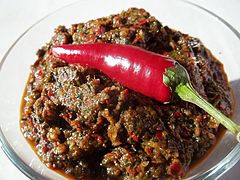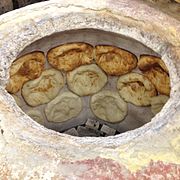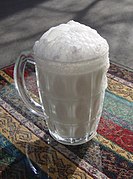List of dishes from the Caucasus
 From Wikipedia - Reading time: 15 min
From Wikipedia - Reading time: 15 min
This article has multiple issues. Please help improve it or discuss these issues on the talk page. (Learn how and when to remove these messages)
|

The following dishes and beverages are part of the cuisine of the Caucasus, including Armenia, Azerbaijan, Georgia and the North Caucasus.
Traditional dishes
[edit]Plates
[edit]
Some popular cheeses from the Caucasus include:
- Ashvlagwan (Ашвлагуан) — Abkhaz smoked cheese, similar to sulguni.
- Chechil (Չեչիլ) — String (often smoked) cheese, made in Armenia.[3]
- Adyga kwae (Адыгэ Къуае) — Mild cheese, made in Circassia.
- Chkinti' (ჭყინტი) — Salty and "juicy" cheese made originally in Imereti.
- Dambalkhacho (დამბალხაჭო) — "Rotten" cheese made in Pshavi and Mtiuleti.
- Guda (გუდა) — Cheese made from sheep milk in Tusheti. Its preparation takes 20 days.

- Earon tsykht (Ирон Цыхт) — Cheese made in Ossetia.
- Qatik — Sour creamy cheese, made in Azerbaijan.
- Sulguni (სულგუნი) — One of the most famous cheeses from Mingrelia, made from cow or buffalo milk.
- To-beram (ТIо-берам) — Cottage cheese mixed with sour cream, made traditionally in Chechnya and in Ingushetia.
Dough
[edit]- Achma (აჩმა / Ачма) — Fluffy pastry with cheese, traditionally made in Georgia,[4] especially in Abkhazia.
- Afar (Афарар) — Lezgian flatbread stuffed with various fillings, mostly meat or cottage cheese.
- Chepalgash (ЧIепалгаш) — Chechen and Ingush pie filled with cottage cheese and wild garlic.
- Chudu (Чуду) — Sort of pie, made in Dagestan with various fillings (meat, cheese, cottage cheese, herbs, etc).
- Dalnash (Далнаш) — Chechen and Ingush pie filled with lard and wild garlic.
- Haliva (Хьэлжъо) — Circassian triangular fried pie, often filled with Circassian cheese and potatoes.
- Hingalsh (Хингалш) — Chechen and Ingush pie with a half-round shape, filled with pumpkin.
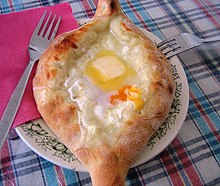
- Kubdari (კუბდარი) — Svan pie filled with spicy meat.[5]
- Khachapuri (ხაჭაპური) — Georgian pie filled with cheese. This dish has a lot of regional variation, the most famous being Adjaruli Khachapuri, shaped in a form of a boat.
- Khichin (Хычин) — Balkar and Karachay pie filled with various stuffing.
- Ossetian Pies — Davondzhin (filled with a mixture of Ossetian cheese and wild garlic leaves / Kabuskadzhin (filled with cabbage and cheese) / Kartofdzhin (filled with potato and cheese) / Nasdzhin (filled with mashed pumpkin) / Khabizdzhin (filled with cheese and potato) / Artadzhikhon (filled with cheese) / Fidzhin (filled with minced meat) / Kh'adurdzhin (filled with kidney beans) / Tsakharadzhin (filled with beetroot and cheese).
- Qutab — Azerbaijani cooked dough filled with meat or pumpkin.
- Zhingyalov hats (Ժենգյալով հաց) — Armenian flatbread stuffed with diced herbs and vegetables such as spinach.
Starters and snacks
[edit]
- Ajapsandali (აჯაფსანდალი / Աջափսանդալ / Əcəbsəndəl) — Cold starter containing aubergines, potatoes and spices. It is traditionally made in Georgia, Armenia and in Azerbaijan.
- Basturma (Բաստուրմա / Basdırma) — Seasoned and air-dried cured beef.
- Choban salad (Çoban) — Azerbaijani salad made from tomatoes and cucumbers.
- Dolma / Tolma (Dolma / Տոլմա / Tolma / Долма) — Vegetable (cabbage, zucchini, grape leaf, aubergine, pepper) stuffed with minced meat and rice, mostly made in Armenia and Azerbaijan.
- Kupati (კუპატი) Sausage made in Western Georgia.
- Lobio (ლობიო) — Cooked minced beans with addition of coriander, walnuts, garlic and onion.
- Nigvziani Badrijani (ნიგვზიანი ბადრიჯანი) — Fried aubergine with walnut sauce and pomegranate seeds.
- Pkhali (ფხალი) — Minced vegetables (cabbage, beet, aubergine) with pomegranate seeds.
- Sujuk (Սուջուխ / Sucuk) — Dry and spicy sausage, mostly made in Armenia and Azerbaijan.
Soups
[edit]- Bugleme (Буглеме) — Meat stew, served by the Mountain Jews.
- Chakapuli (ჩაქაფული) — Stew made of lamb or beef (or veal), tarragon and cherry plums in Eastern Georgia (Kakheti and Kartli).
- Chakhokhbili (ჩახოხბილი) — Soup made of tomatoes and poultry meat (mostly chicken or turkey) which originated in Western Georgia.
- Chikhirtma (ჩიხირთმა) — Soup made of turkey or chicken meat and eggs which is traditionally made in Kakheti.
- Dovga (Dovğа) — Soup made of yoghurt and fresh herbs, traditionally made in Azerbaijan.
- Kharcho (ხარჩო) — Soup made of beef, rice, cherry plums and walnuts from Mingrelia.
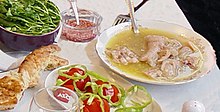
- Khash (խաշ, Xaş, ხაში) — beef or lamb feet in its broth with garlic. It is eaten throughout the Transcaucasia.
- Piti — Azerbaijani soup made with mutton and vegetables.
- Chorba — Types of soup usually made with lamb and beef, fried vegetables and herbs which is made in every country in Caucasus, especially in Dagestan and Azerbaijan.
- Spas (Սպաս) — Armenian soup made with matzoon.
- Tarhana (Թարխանա) — Soup made with matzoon and flour.
Main courses
[edit]- Apkhazura (აფხაზურა) — Fried meat enrolled in caul fat, traditionally made in Abkhazia.
- Amcheg (Амчег) — Lezgin roasted turkey.
- Balıq — Azerbaijani grilled fish (commonly sturgeon) with sour-cream sauce.
- Barsh (БӀарш) — Chechen and Ingush dish, consisting of a mutton stomach stuffed with minced meat.
- Chanakhi (ჩანახი) — Georgian tomato-based stew with spiced lamb, potatoes, aubergines.
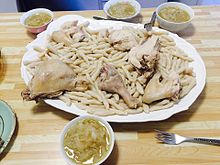
- Tabaka Qatami (ტაბაკა ქათამი) — Georgian roasted chicken with adjika, traditionally made in Mingrelia.
- Dzhed (Джед) — Circassian chicken in a sauce, similar to satsivi.
- Dushbara (Düşbərə) - Azerbaijani dumplings served with mutton and vegetables in its broth.
- Jijig-Galnash (Жижиг-Галнаш) — Chechen and Ingush dish consisting of Galnash (boiled dough) with meat and its broth.
- Ghapama (Ղափամա) – Armenian baked pumpkin with rice, dried fruits and honey inside.
- Holtmash (ХьолтӀмаш) — Chechen and Ingush dumplings made from cornmeal stuffed with nettles.
- Kchuch (Կճուճ) — Armenian dish made of mixed vegetables and meat and fish.
- Khali-Nukun (ХIали-Нукьун) — Dargin dish consisting of a fat-tailed lards with oatmeal.

- Hinkal (Хинкал) — Dagestani boiled dough, eaten with lamb or beef.
- Khinkali (ხინკალი) — Georgian dumpling stuffed with meat, vegetables or cottage cheese.
- Khoyagusht (Хоягушт) — Meat pie from the cuisine of Mountain Jews, Made of eggs, turmeric, slow cooked meat (usually sheep or goat) and its broth.
- Kofta (Küftə / Քուֆթա / გუფთა) — Spiced meatballs, made in Transcaucasia.
- Kuchmachi (კუჭმაჭი) — Fried chicken livers with pomegranate seeds.
- Kurze (Курзе) — Long shaped dumplings stuffed with meat, popular among Dagestanis.
- Mataz (Мэтазэ) — Circassian dumplings stuffed with various fillings (meat, cottage cheese, potato).
- Lahmajun (Լահմաջու) — Flatbread topped with minced meat. Made in Armenia and Turkey.

- Lavangi (Ləvəngi) — Azerbaijani baked chicken or fish stuffed with walnuts and spices.
- Libzhe (Либжэ) — Circassian stew made of beef, similar to goulash.
- Lula kebab (Lülə Kabab) — Azerbaijani kebab made from minced meat (often enrolled in lavash).
- Manti (մանթի / Манты / Мантиш) — Dumplings, brought by Turks which is commonly made in Southern Caucasus.
- Plov (Plov / Փլավ / ფლავი / Плов) — Rice dish, mostly cooked with meat and vegetables.
- Qovurma — Azerbaijani lamb stew.
- Satsivi (საცივი) — Georgian poultry meat (turkey or chicken based dish with walnuts.
- Shashlik / Mtsvadi / Khorovats — Cooked meat on fire, made in all of the Caucasus.
- Tjvjik (տժվժիկ) — Armenian fried offal dish.
- Yokh (Йоьхь) — Chechen and Ingush spicy sausage from mutton and flour.
Condiments and sauces
[edit]
- Ajika (აჯიკა / Аџьыка) — Hot and spicy paste made from peppers, garlic, herbs, spices, walnuts and salt. It originated in Western Georgia, in the regions of Mingrelia and Abkhazia but used in all Caucasus.
- Matzoon (Մածուն / მაწონი) — Fermented milk, similar to yoghurt, eaten in Armenia and Georgia.
- Narsharab — pomegranate molasses, made and used in Azerbaijan.
- Bazhe (ბაჟე) — walnut sauce with spices.
- Tkemali (ტყემალი) — cherry plums sauce.
- Urbech (Урбеч) — Urbech is a traditional Dagestan paste of ground seeds or nuts.
Breads
[edit]
- Choereg (Ցուրեկի) — Braided bread made for Easter.
- Matnakash (Մատնաքաշ) — Armenian bread made with wheat flour and tea.
- Lavash (Լավաշ / ლავაში / Lavaş) — Flatbread made in tandoor which is quite popular in the South Caucasus. Of Armenian origin.
- Mchadi (მჭადი) — Fried bread made from cornmeal.
- Shotis puri (შოთის პური) — Bread shaped like a canoe.
- Siskal (Сискал) — Fried bread made from polenta in Ingushetia and Chechnya.
- Tonis puri (თონის პური) — Popular Georgian bread baked in a traditional tone.
Desserts
[edit]- Alani (Ալանի) — Armenian sweet made from dried apricot stuffed with ground walnut and sugar.
- Baldzhin (Балджын) — Ossetian sweet pie filled with cherries.

- Churchkhela (ჩურჩხელა) — Georgian sweet made from mixed grape juice and flour with chopped walnuts or hazelnuts.
- Gata (Գաթա) — Armenian pastry / sweet bread.
- Gozinaki (გოზინაყი) — Sweet made by Georgians for New Year consisting of chopped walnuts and honey.
- Gvaymakkhsh (Гваймакхш) — Chechen / Ingush pancakes with honey.
- Halva (Halva / Հալվա / ჰალვა / Хьовла / Халва) — Sweet made from flour. The origin is Azerbaijan.
- Harbiz Fo (Хьарбиз фо) — Circassian watermelon honey.
- Mikado cake chocolate cake from Armenia made with condensed milk
- Murabba (Mürəbbə / Մուրաբա / მურაბა) — Jam made traditionally in Transcaucasia with local fruits such as cherry, strawberry, raspberry, apricot, fig, watermelon, etc., but also from walnuts.
- Natyoukh (НатIюхI) — Lak candy made with a mixture of honey and sugar with apricot kernels and walnuts.
- Pakhlava (Paxlava / Փախլավա / ფახლავა) — Sweet pastry made with filo layers. It is made in the Transcaucasian countries.
- Pastegh (Պաստեղ) — Dried fruit.
- Pelamushi (ფელამუში) — Kakhetian traditional candy made from grape juice and flour.
- Shekerbura (Şəkərbura) — Azerbaijani sweet pastry filled with almonds, walnuts or hazelnuts. It is consumed during Nowruz, the Zoroastrian New Year.
Beverages
[edit]Alcoholic
[edit]- Arak (Арахъ) — Ossetian vodka made from cereals such as wheat or barley. However, some are made with fruits especially by the Ossetians of Georgia.
- Ararat (Հայկական կոնյակ) — Famous Armenian brandy made from white grapes and spring water.
- Armenian wines (Հայկական գինիներ) — Most famous include : Voski, Karasi, Yeraz.
- Boza — Type of sweet and sour beer with little degree of alcohol, made from cooked wheat and barley flour. It is primarily consumed in Azerbaijan.
- Bagany (Бæгæны) — Ossetian beer made from wheat, barley and maize.
- Chacha (ჭაჭა) — Georgian vodka made from pomace (grape) or other fruits which is often homemade.
- Georgian wines (ქართული ღვინოები) — Most famous include : Saperavi, Tsinandali, Akasheni, Kindzmarauli, Kvanchkara, Lykhny (made in Abkhazia), etc. Most of the wines are made in the region of Kakheti.
- Makhsima (Мэхъсымэ) — Circassian alcohol made from corn flour and wheat. Similar to boza but has higher alcohol content.
Non-alcoholic
[edit]
- Ayran / Tan (Ayran / Թան) — Yogurt-based salty beverage, popular in Armenia, Azerbaijan and the North Caucasus.
- Borjomi (ბორჯომი) — Carbonated mineral water from the Borjomi Gorge.[6]
- Jermuk (Ջերմուկ) — Mineral water from Jermuk (Armenia).
- Kampot (Компот) — Very sweet beverage made from local fruits which is often homemade.
- Lagidzis Tsklebi (ლაღიძის წყლები) — Fruit- or chocolate-infused water, often sold in streets.
- Nogai Tea (Ногай Шай) — Salty tea brought in Northern Caucasus by the Nogais (Popular among the Dagestanis).
- Sharbat (Şerbet) — Azerbaijani refreshing beverage made from herbs (such as mint) or fruits.
- Tach (ТӀач) — Lak kissel made from cereals.
- Tarkhuna (ტარხუნა) — Georgian lemonade with tarragon flavour.
- Tea (Çay / Թեյ / ჩაი / Чай / Цай) — Tea is an important beverage in the Caucasus and is cultivated mostly in Azerbaijan and on the Georgian coast. (Black tea is the most popular variety of tea in the region.)
Gallery
[edit]-
Khichin
-
Ossetian pie, Fidzhin
-
Dolma
-
Dovğa
-
Mataz and Haliva
-
Adjika (red)
-
Tonis puri in Tone
-
Pakhlava
-
Ayran/Tan
See also
[edit]- Armenian cuisine
- Azerbaijani cuisine
- Georgian cuisine
- Soviet cuisine
- History of the Caucasus
- Peoples of the Caucasus
References
[edit]- ^ Pokhlebkin, William Vasilyevich (2004) [1978]. Natsionalnye kukhni nashikh narodov (Национальные кухни наших народов) [National Cuisines of Our Peoples] (in Russian). Moskva: Tsentrpoligraf. ISBN 5-9524-0718-8.
- ^ Culture and Life. Union of Soviet Societies for Friendship and Cultural Relations with Foreign Countries. 1982 – via Google Books.
The Russian term, shashlik, has an interesting etymology: it would seem natural for the word to be borrowed from one of the Caucasian languages. But no, the Georgian for it is mtsvadi, the Azerbaijani, kebab. Shashlik is a Zaporozhye Cossack coinage from the Crimean Tatar sheesh (spit), brought to Russia in the 18th century, after Field-Marshal Mienich's Crimean campaign. Prior to the 18th century, the dish was called verchenoye, from the Russian vertel, spit.
- ^ Petrosian, I.; Underwood, D. (2006). Armenian Food: Fact, Fiction & Folklore. Armenian Research Center collection. Yerkir Publishing. p. 47. ISBN 978-1-4116-9865-9. Retrieved 11 December 2019.
- ^ Williams, S. (2015). The Ethnomusicologists' Cookbook, Volume II: Complete Meals from Around the World. Taylor & Francis. p. 157. ISBN 978-1-135-04008-6. Retrieved 11 December 2019.
- ^ Goldstein, D. (2013). The Georgian Feast: The Vibrant Culture and Savory Food of the Republic of Georgia. University of California Press. p. 13. ISBN 978-0-520-27591-1. Retrieved 11 December 2019.
- ^ Barile, S.; Espejo, R.; Perko, I.; Saviano, M. (2018). Cybernetics and Systems: Social and Business Decisions. Routledge-Giappichelli Systems Management. Taylor & Francis. p. pt111. ISBN 978-0-429-94460-4. Retrieved 11 December 2019.
Further reading
[edit]Wikimedia Commons has media related to Cuisine of the Caucasus.
- Beliaev, Edward; Oksana Buranbaeva (2005). Cultures of the World: Dagestan. Marshall Cavendish. ISBN 0-7614-2015-0.
- Sami Zubaida, Richard Tapper. A Taste of Thyme: Culinary Cultures of the Middle East (2nd ed.). London & New York: Tauris Parke Paperbacks. ISBN 1-86064-603-4.
- В. В. Похлебкин. Национальные кухни наших народов. Москва: Пищевая промышленность (in Russian), 1980. ISBN 978-5-9524-2783-9 (William Pokhlyobkin, Ethnic Cuisines of our Peoples. Moscow: Soviet Food Industry publishing house, 1980).
Licensed under CC BY-SA 3.0 | Source: https://en.wikipedia.org/wiki/List_of_dishes_from_the_Caucasus5 views | Status: cached on November 23 2024 18:08:18↧ Download as ZWI file
 KSF
KSF




